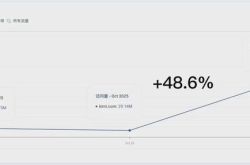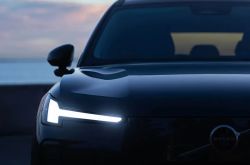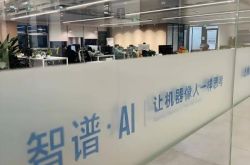"AI Phones", officially kicking off
![]() 06/25 2024
06/25 2024
![]() 811
811
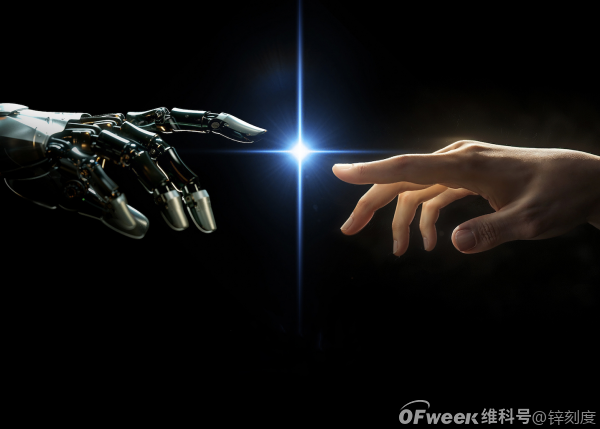
The curtain rises on the popularization of AI phones
Written by Meng Huiyuan
Edited by Li Wenjie
Typeset by Annalee
Since Apple officially announced "Apple Intelligence" at WWDC, providing a series of AI functions for devices such as iPhone and Mac, AI phones seem to have gained more momentum as the next game-changing product, similar to how feature phones were replaced by smartphones.
In fact, the trend of AI phones started earlier in China. For example, OPPO CEO Chen Mingyong mentioned in an internal letter to employees at the beginning of 2024 that "2024 is the first year of AI phones, and the AI phone era will become the third stage of the mobile phone industry after feature phones and smartphones." On the same day, Meizu also announced a strategic adjustment, halting the development of traditional smartphone new projects and focusing all efforts on "tomorrow's devices," namely AI phones, while embracing AI.
With Apple officially joining the "AI battlefield" on June 11, the momentum of AI phones is clearly accelerating towards greater strength.
Not only has Huawei deeply integrated its HarmonyOS operating system with large models to achieve a full AI ecosystem; Xiaomi has also integrated advanced AI functions into its latest operating system; even Realme dares to claim that its goal is to sell 100 million AI phones in the next three years... But whether all this is just concept hype or a genuine turning point remains to be seen over time.
Apple is late to the game, but with greater ambitions
From a practical perspective of technology implementation, AI phones are in a sense more like an iteration of smartphones – they not only integrate artificial intelligence technology to provide users with a more intelligent and convenient experience such as image recognition and voice recognition, but also understand and respond to users' voice commands and perform complex computational tasks, such as providing relevant information by analyzing the content of images or videos.
Based on this, examining the actual implementation of AI phone-related functions in China, we can see that mainstream phone manufacturers such as Huawei, OPPO, vivo, OnePlus, and Honor have all taken explicit actions to promote the AI phone landscape, including equipping their new flagship models with self-developed large models with different parameters.
After experiencing some AI phone products that have already been launched, Zinc Carve found that AI functions empower phones in roughly two forms: one is to launch intelligent assistant apps with AI functions such as intelligent image expansion, semantic search, writing Q&A, and the other is to deeply integrate AI technology into their phone systems and internalize functions into specific operations.
The former is exemplified by the vivo X100 Ultra, which is equipped with "Blue Heart Little V," the first global intelligent assistant introduced by vivo at the November 1st developers conference last year. Whether it's quickly obtaining answers through conversation, quickly browsing and summarizing documents, or generating images from text and images, most of the main functional applications related to AI large models are available on this app.
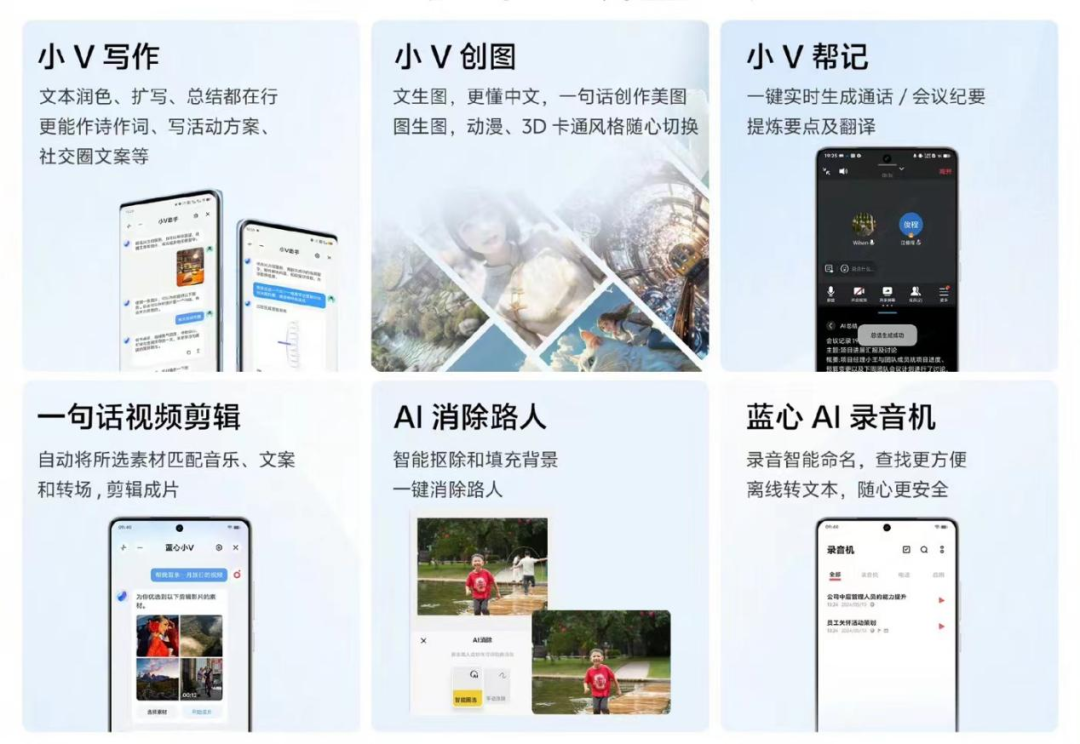
Blue Heart Little V function demonstration (source: vivo official Weibo)
The latter is the case with the Honor Magic6 Pro, which introduces platform-level AI into its MagicOS 8.0 phone system to provide an intent-based human-computer interaction experience. In other words, the phone can actively understand the user's intent and provide corresponding services. For example, by long-pressing and dragging information, relevant apps that the user might use will automatically appear on both sides to facilitate quick next-step operations.
By contrast, although Apple's entry time is half a beat slower, it has full ambition.
According to previous demonstrations by Apple, it has adopted a more open approach to AI functionality, unlike other mobile phone brands that limit AI functionality to specific applications or voice assistants. Instead, it has integrated it into the entire system application level, such as the new system's built-in "Image Playground" tool, which not only supports users to generate images through text or sketches, but also can be accessed by other third-party apps in addition to native Apple apps such as information, memos, and borderless notes.
In addition, with new designs and features, Siri responses have become more tailored to the user's personal situation. In order to further enhance the AI attributes of Apple phones, it was also revealed that Apple is finalizing a cooperation agreement with OpenAI, which allows users to request the system to call ChatGPT in response during the use of Siri and a series of applications in the future.
However, it is worth noting that Apple's "both inside and outside" gameplay will only see its technical performance and actual results when it is released in the autumn.
Using AI as a gimmick makes it a bit difficult for users to make purchases
Leaving aside Apple's AI smartphone futures, many users have unclear perceptions of AI phones that have already been released: "AI features such as synchronous translation and article summarization really take very little time to use." "Some features have some limitations, such as requiring it to write a work report and secondary processing, and the final effect of P images is not very stable."
As these voices have pointed out, the current contradiction in the application of AI phone functions lies in the fact that users hope to have a versatile intelligent butler like "Jarvis" in the movie "Iron Man", but the actual implementation performance of AI phones is only a more accurate intelligent assistant. This gap has greatly limited the application scenarios of AI phone related functions. "AI phones have not yet found a point that can truly attract a larger user group to pay for purchases."
"There are issues with market cultivation and user education in it." As a reviewer who has been active in various new mobile phone products for a long time, since the beginning of 2024, Wang Qi has experienced most products on the market labeled as "AI phones". "At present, AI can only be said to add flowers to the brocade, and most mobile phone manufacturers make AI functions very extensive, so the final effect presented is' you have it, I have it, everyone has it ', and even the experience of some free AI applications outside is almost the same."
After following the feedback from fans, Wang Qi found that among the potential target audience of AI phones, a considerable number of people do not have a strong willingness to purchase. "Although AI phones are popular, most people still buy new phones mainly based on the brand and configuration.".
In addition, due to user habits, compared to switching to an AI application newly launched by a mobile phone manufacturer, some people still prefer to operate it in a familiar way, and now it can be seen that some functional software is also launching corresponding AI functions. "They already have their own AI software, will users still use the AI on your phone?"
"A slightly more widely used AI feature currently is intelligent elimination, which can remove some unwanted elements from photos." According to Wang Qi, for users with slightly more complex needs, such as generating PPTs, summarizing documents, and weekly work reports through AI phones, at most, they can only lay a foundation, and ultimately, users need to improve it themselves.
More importantly, for mobile phone products that have been boosted by big model technology, mobile phone manufacturers seem to have not yet found a real starting point. "This feeling is like everyone recognizes the development direction of AI, but currently we have only tried to do some related functions. There are no unique features that are close to our own brand tone, nor can we say that our AI technology is superior to our peers. If that's the case, how can consumers who only see a 'AI phone' label pay for it so quickly?"
Will the era of AI phones come after the catfish?
According to the Quarterly Report on China Mobile Internet Traffic in Q1 2024 released by iResearch, by the end of the first quarter of 2024, the number of independent mobile Internet devices in China had exceeded 1.4 billion per month, but the traffic growth curve was significantly flat, user stickiness tended to be stable, and the market was approaching saturation.
It is undeniable that in the era of big models sweeping across various industries, the already competitive mobile phone industry has finally found a good direction to boost sales.
Zhejiang Securities stated that overseas AI manufacturers, represented by Apple, continue to make efforts in the field of end-to-end AI, and the vertical application of AI models in end-to-end scenarios is expected to accelerate. Dongfang Securities stated that 2023 will be the year for the implementation of the large-scale AI model for mobile phones, and 2024 will be the year for the rapid development of AI smartphones. It is optimistic that the increase in the penetration rate of end-to-end AI will bring long-term investment opportunities to the mobile phone industry.
Although "AI phones" seem to have higher gimmicks than technological content at present, the industry's development situation may usher in new changes with the support of the "catfish effect" after Apple's high promotion of "Apple Intelligence".
After all, with the combination of "Built in Artificial Intelligence (AI)+Enhanced Siri+Third Party Applications (ChatGPT)", it is almost possible to eliminate a considerable portion of user habits. The "gap period" from the launch event to the official release of Apple's AI phones happens to be a crucial time for major brands to accelerate their market layout.
"The head effect of mobile phone brands is more obvious. Previously, most brands may have only seen the direction and launched some general AI functions to test the waters, but after Apple enters, everyone needs to take it seriously." Some practitioners believe that Apple's fate, in a sense, is truly determining a new development direction for other mobile phone brands. "Apple's brand power is indeed top-notch in the industry, and the execution of top brands is so strong that everyone will definitely keep up."
So looking at the dynamics of related companies, it is not difficult to see that some mobile phone manufacturers have also become more bold in their behavior. Just a few days ago, Zhenwo officially announced its global NEXT AI strategy, and Zhenwo Vice President Xu Qi also stated that Zhenwo's goal is to sell 100 million AI phones within the next three years.
"Industry giants such as Apple, Huawei, and Xiaomi have increased their investment in the field of AI, leading the mobile phone industry chain enterprises to 'race'. Industry chain enterprises not only seek breakthroughs in hardware, but also fully integrate AI into operating systems, applications, and services." Xiao Xu, a director of the Capital Enterprise Reform and Development Research Association, made a similar judgment on industry development trends in an interview with Securities Daily.
As for whether AI phones can truly become a new revolutionary product, let time give us the answer.

